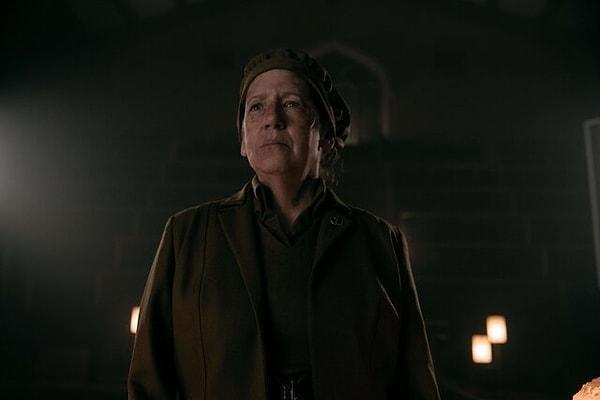In the eyes of a Gileadean fascist, humans are incapable of ruling themselves. In order to prosper and please the Lord, they need a government based on scripture and God's law, and someone with a firm hand to keep the masses in line. Lydia began to accept this message when she was introduced to Aunt Vidala, Aunt Elizabeth, and Aunt Helena. They were called the founding aunts, and they were tasked with building a separate, female sphere of government. The separation was Lydia's idea. She did not want men to rule over women. But she did believe in what they created--the window dressing, uniforms, prayers, and methodology. She was very proud of it. Judd took all of the credit for these things, and in fact, he was named as a mastermind in the first epilogue.
None of this happened in the Hulu series. Lydia didn't mind compromising liberty in favor of theocratic rule. She didn't have to come to a major revelation to believe in strict governance. She already believed that children should be raised by believers, and she didn't seem to think there was anything wrong with the changes Gilead was making behind the scenes. There were no founding aunts, either. We have met an Aunt Elizabeth, but she's only mentioned in passing. Aunt Helena and Aunt Vidala have not been named, and it's been made obvious that Lydia has nowhere near as much power as she did in The Testaments. The eyes were not banned from entering Ardua Hall, for example. She was stripped of her position after June and the other handmaids ran away. She was really just an ordinary aunt who was earning a reputation for herself.
It's likely that TV Lydia started out as a faithful protestant who attended church multiple times per week. It's easy to imagine her swaying back and forth, tears streaming down her face as she lifts her hands to God. She would lose herself in the music--tearful ballads and upbeat praise and worship tracks, all designed to pull her in and create the same malleability that Testament's Lydia experienced in her dark cell. Then sermons would come on, a well-dressed pastor shouting 'Praise Him,' and 'Isn't He good?' before going on a lengthy rant. This would be accompanied by a keyboard or a piano, meant to emphasize their message and drive it home. Women in her generation did attend church. They defined themselves by their denomination and the beliefs that were set out before them, and they shunned anyone who refused to go. This would've gone on for decades--her entire life, in fact--and it would've only gotten more intense as the Sons of Jacob infiltrated mainstream Christianity in America. They appeared on Christian broadcasting channels. They'd send out propaganda material--books and pamphlets, and they would spread their message throughout the many Christian colleges and universities that have become so popular as of late. Conservatives would do what they always do: Follow along and demonize anyone who resisted. Whether we are willing to admit it or not, this follows textbook brainwashing methodology. There was social reinforcement; her identity was tied to her beliefs, and they were backed up by the emotion necessary to blind her to reality--all because of tried and true tactics developed to reach congregations.


